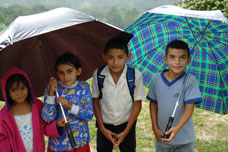EU announces new support for education for all in developing countries

The EU pledged today new funding for the Global Partnership for Education, to improve basic education in over 46 developing countries. The new support was announced at a Pledging Conference in Copenhagen of over 200 participants from more than 40 countries, organised by the Global Partnership for Education to replenish and mobilise resources and political commitments to support education for all in developing countries.
Commissioner Piebalgs stated: "Over the last decade, the world has made considerable progress in primary education. The EU has had a key role to play in this - since 2004, more than 9 million pupils have been enrolled in primary education thanks to our support. Now we need to concentrate on improving the quality of that education, therefore I proposed to spend at least 20% of aid on human development and social inclusion. This will also benefit the Global Partnership for Education in these efforts."
The new "Agenda for Change" in EU development policy proposes to strengthen the EU's commitment to education. It states that the EU should focus on those sectors which build the foundations for sustainable growth and help ensure that it is inclusive. These include education, health and social protection for all.
The Global Partnership for Education (GPE) works towards getting the 67 million children currently out of school in developing countries into a school for a quality education. The EU's new commitment will provide €31.8 million to the GPE Fund between 2011 and 2013.
Facts and figures
Since 2004, thanks to bilateral Commission support:
- More than 9 million pupils have been enrolled in primary education
- More than 85,000 new female students have been enrolled in secondary education
- More than 720,000 primary school teachers have been trained.
The priority that the Commission places on education is reflected in its level of support in the current programming cycle (2007/8-2013).
Support to education in 46 countries with a total amount of €3.9 billion:
- €2.2 billion for primary and secondary education,
- €0.5 billion for Technical and Vocational Education and Training, and
- €1.2 billion for the EU's higher education programmes with the developing world.
In addition to direct support to education, the European Commission provides a substantial contribution via general budget support to countries; many of which are GPE-endorsed. The total amount of general budget support amounts to €3.4 billion (2007/8-2013), out of which €2.3 billion are endorsed by countries belonging to Global Partnership for Education.
Out of the 46 countries supported by the Commission, 17 are fragile or affected by conflict, so that €900 million (or 33% of our funding to basic education and technical and vocational education and training) goes to these countries.
The Commission has recently committed new funding to Sudan, South Sudan (€12 million each) and Somalia (€30 million in addition to an earlier commitment of €55 million).
Global Partnership for Education
Established in 2002, the Global Partnership for Education is comprised of 46 developing countries, and over 30 bilateral, regional, and international agencies, development banks, the private sector, teachers, and local and global civil society groups. Over 15 more developing countries are expected to join the partnership in the coming years.
The Global Partnership for Education Fund has provided US$2.2 billion in financial aid between 2004 and 2010.
Since 2003, thanks to partners working together, 19 million children have been put into school, 200 million textbooks have been distributed, 300,000 additional teachers were hired, 30,000 classrooms were built and daily school meals were provided to 700,000 children.
In GPE countries, 68% of girls now finish primary school, the primary school completion rate has increased from 60% in 2002 to over 72% in 2009 and repetition rates have on average halved within 3-5 years of their entry to the Partnership.















